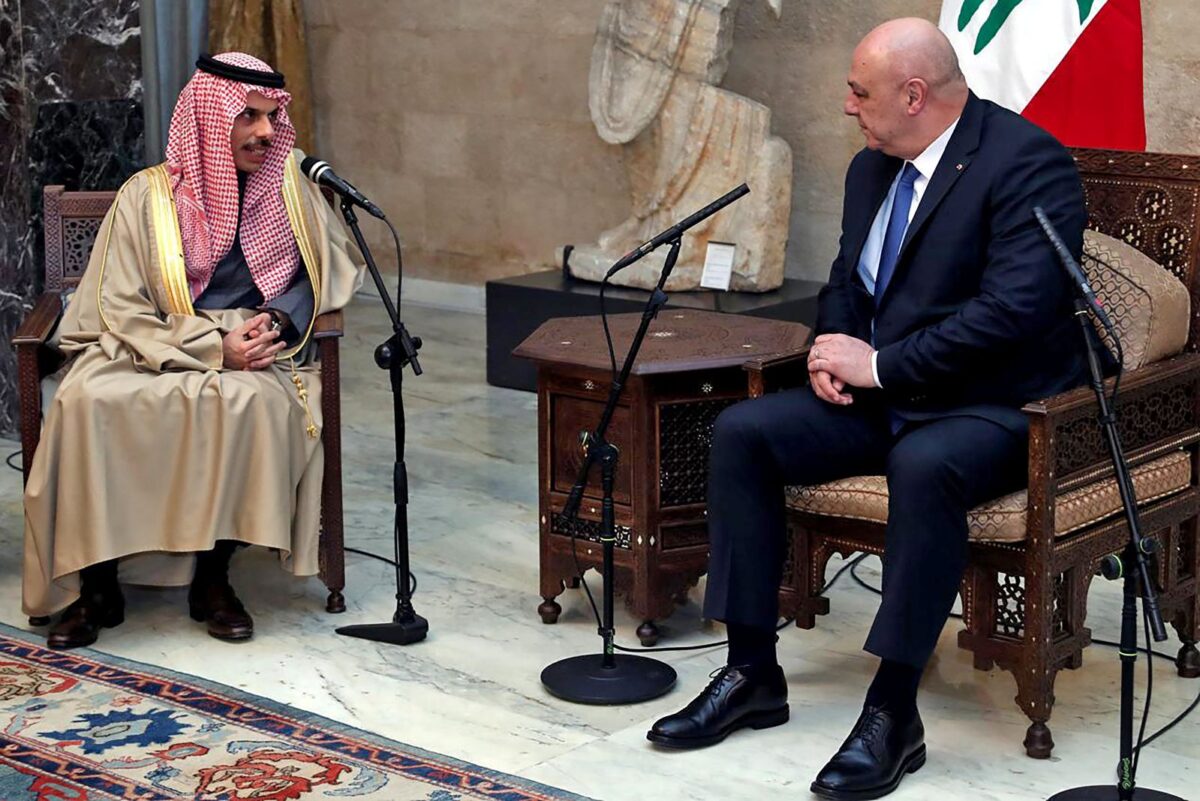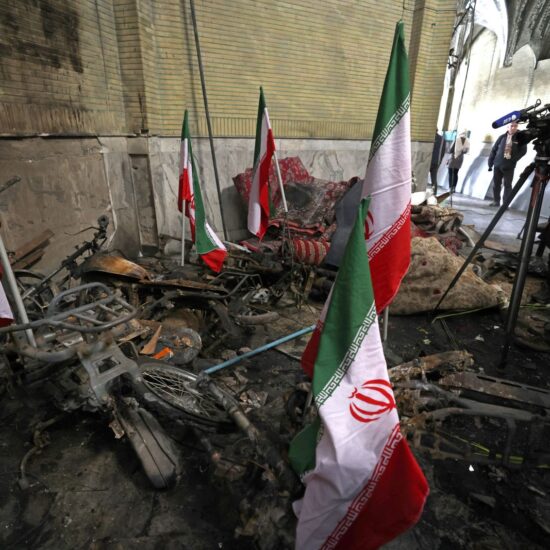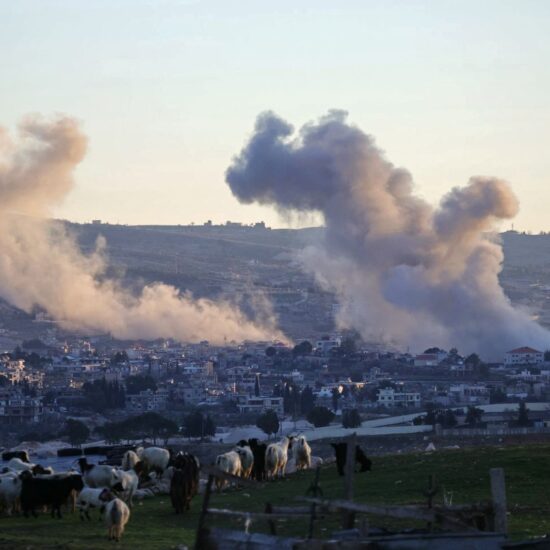
Saudi Arabia considers easing its four-year import ban on Lebanon, but at one condition: “to preclude the use of Lebanon as a platform for threats to Arab states’ security”
74 billion dollars and a lift on Saudi exports’ ban. This is the size of the investment – the size of some’s dream – that the Beirut One conference held at the Seaside Arena from 18 to 19 November openly called for. The message: Lebanon is ready to be finally seen as a destination for investment, and not anymore as a country in perpetual need. Although, in the very same hours, it is being bombed by American weapons, under Israeli will – its citizens displaced, their villages occupied, hundreds of children made orphans, the houses once liberated, destroyed. Only waiting for Trump’s approval to be rebuilt with Gulf money. Yet, at one only, strict condition: the complete disarmament of Hezbollah. A condition that also Saudi Arabia requires.
Framed by the Lebanese government as a key moment for Arab and diaspora re-engagement, Beirut One brought together the Lebanese state, the private sector, the diaspora, and regional and international partners, with Saudi Arabia participating for the first time in years – an aspect that stood as particularly important after a long disconnection with the country following the ban on Lebanese imports due to drug smuggling. Despite this move, though, the Gulf Kingdom still has a main political and security demand on wanting progress on disarming the Iran-backed group.
Speaking at the conference, President Joseph Aoun renewed Lebanon’s commitment to its Arab and international partners, stressing that the country must regain its natural role as an economic and cultural player in the region, “a bridge between East and West,” and a platform for cooperation among companies, investors, and development institutions. Aoun emphasized that the reforms underway are not easy and face resistance from within the system, as real change challenges entrenched interests, yet he vowed to continue the reform path.
Stressing that the state has worked, and continues to work, to maintain internal security, he noted that any investor coming to Lebanon must feel assured that their protection does not depend on political whims but is grounded in the rule of law. “Lebanon seeks not temporary calm,” he said, “but sustainable stability.”
“Security and safety can only be achieved by extending the state’s authority over all its territory,” echoed Prime Minister Nawaf Salam at Beirut One. Speaking about regaining control over the decision of war and peace in Lebanon, “we confiscated weapons and dismantled military installations,” he added – reassuring, at least in words, Saudi expectations, yet raising doubts as to whether it would be enough: as apparently it was not for the Americans.
A Saudi technical committee led by Saudi envoy Prince Yazid bin Farhan had already arrived in Lebanon last Monday, November 17, to discuss lifting the ban on Lebanese imports. The previous week, a senior Saudi official had announced that the Gulf kingdom plans to imminently bolster commercial ties with Lebanon, after Lebanese authorities demonstrated “efficacy” in curbing drug smuggling to the country over the past months – with both Prime Minister Nawaf Salam and President Joseph Aoun enthusiastically welcoming the move.
“We are grateful and thankful, and I reiterate on this occasion our commitment that Lebanon will not be used as a platform to destabilize the security of its Arab brothers or be a transit point for smuggling drugs or any illegal products,” Salam said after meeting the Saudi delegation.
A history of strained ties
Relations between Beirut and Riyadh have been tense for years, largely because of Hezbollah’s unwelcome influence over Lebanon’s political and security landscape. Yet Saudi Arabia now sees a potential opening, as the Shiite group emerged significantly weakened after both last year’s war with Israel and its current refusal to capitulate, despite the enemy’s ongoing campaign of targeted assassinations, house demolitions and terror attacks. A relaxation of import restrictions – prohibitions Saudi Arabia has enforced for several years – would mark the first concrete sign of a thaw. Still, Riyadh continues to insist that Lebanon’s fragile central government move toward disarming Hezbollah, a step the group has consistently refused.
“We will take imminent steps to bolster commercial relations between the two nations,” a Saudi official who requested anonymity told Reuters, adding that Lebanese authorities and security services have shown actual “efficacy in curbing drug exports over recent months.” According to the official, a Saudi delegation is expected to visit Lebanon shortly for talks aimed at “resolving the barriers hindering Lebanese exports to the Kingdom,” though he did not specify what actions might be considered or which sectors could be impacted.
“Our deepest gratitude goes to the Kingdom of Saudi Arabia and its leadership,” the Lebanese Prime Minister Nawaf Salam said in a post on X, “for its kind initiative today in announcing its readiness to take immediate steps to strengthen trade relations between our two countries and remove obstacles to Lebanese exports.”
In 2019, Saudi Arabia was Lebanon’s largest market for agricultural exports, accounting for 22.1 per cent of total shipments, according to a Beirut government report. However, in April 2021, Riyadh imposed a blanket ban on Lebanese imports, citing the smuggling of Captagon, an amphetamine-like substance manufactured in Lebanon and Syria – and accusing Lebanese authorities of failing to act.
Western and Arab governments have long maintained that the Syrian regime of Bashar al-Assad and Hezbollah were central to the production and trafficking of the drug: and massive Captagon facilities were in fact discovered in regime-controlled zones in Syria as well as in border areas where Hezbollah had established a strong foothold after Assad’s forces lost ground.
Back in 2021, the decision dealt another blow to Lebanon’s collapsing economy, already devastated by the 2019 financial meltdown, and left many agricultural producers cut off from their traditional markets in the Gulf. Yet “the new Lebanese administration’s efforts to preclude the use of Lebanon as a platform for threats to Arab states’ security will yield advancements in bilateral relations,” the senior Saudi official added to Reuters.
Why now
Riyadh’s timing reflects a convergence of regional and domestic strategic calculations. Saudi decision-makers are pursuing a broader ‘de-escalation through normalization’ posture across the Middle East, aiming to redirect resources toward Vision 2030 — the Kingdom’s long-term plan to diversify its economy and reduce dependence on oil. Opening markets, securing trade routes, stabilizing regions linked to Saudi investment, as well as cultivating influence through financial leverage rather than direct military intervention – unlike the case of Yemen, where a Saudi-led coalition indiscriminately targeted civilians and civilian infrastructure under the stated goal of restoring then-Vice President Abdrabbuh Mansur Hadi to power – all leads to believe that re-engaging Lebanon would logically fit into this pattern: bolstering commercial ties, reopening trade channels, and potentially shaping the Lebanese economic landscape at a moment of clear dependence.
At the same time, Saudi officials believe Hezbollah’s weakened position – during what seems to be the beginning of a new peak of Israeli violence on the country –, together with the fall of Syria’s Assad regime, have both created a diplomatic window not previously available. However, while Riyadh still demands that the Lebanese state assert control over the armed group, the Kingdom appears willing to proceed incrementally, linking economic incentives to improved state performance rather than to sweeping political concessions.
Lebanon has in fact recently taken a series of steps aimed at demonstrating its seriousness in combating the Captagon trade, long a central Saudi grievance. Authorities have carried out multiple arrests linked to trafficking networks, intercepted several major drug shipments destined for the Gulf, and expanded intelligence coordination with Saudi security agencies, like last summer’s bust that thwarted an attempt to smuggle more than five million amphetamine pills, through Georgia, to Saudi Arabia – or the ISF (Internal Security Forces) raid that in mid-September dismantled an international network and seized roughly 6.5 million Captagon pills alongside hundreds of kilos of hashish, arresting the alleged ringleaders.
Lebanese customs and internal security forces have also tightened monitoring at ports and border crossings, part of a broader effort to prove that the country is no longer a permissive environment for smuggling operations – as well as stopping with targeted arrests a number of high-profile suspects said to be central figures in trafficking networks.
Just yesterday, November 20, the country announced the arrest of a long-wanted alleged trafficker, Noah Zeiter, who had previously been sanctioned by the US and UK for his alleged involvement in the manufacturing and smuggling of Captagon alongside relatives and close associates of the Assad dynasty in Syria. Taken into custody during a raid near the eastern city of Baalbeck, according to a high-ranking military official, Zeiter eventually turned himself in to military intelligence after a standoff: for years, he had been on the run from Lebanese authorities; and even prior to the outbreak of the Syrian war in 2011, he was known for producing and smuggling large amounts of cannabis and made occasional media appearances.
A conditional help
On their side, Saudi officials have cautiously acknowledged these efforts — an important shift after years of accusing Beirut of inaction. But the Kingdom’s renewed engagement is far from unconditional. Riyadh’s message is clear: any improvement in ties will depend on sustained Lebanese compliance on security issues, meaningful governance reforms, and a demonstrated willingness to confront the networks that have destabilized Saudi consumers and Gulf markets.
That shift was already visible earlier this year, when Saudi support helped end Lebanon’s two-year presidential stalemate. Prince Faisal played a key role in that breakthrough, conducting rounds of shuttle diplomacy between rival factions. Moreover, President Aoun’s decision to make Riyadh his first foreign visit after taking office, where he met Crown Prince Mohammed bin Salman, signalled the beginning of a careful re-engagement.
Yet Saudi officials remain measured in their approach. Observers describe Riyadh’s current stance as one of “engaged conditionality,” willing to support Lebanon politically and financially, but only if real reforms are enacted and state sovereignty reasserted. “The kingdom is back,” said one Gulf official, “but not on the old terms.”
This new opening, therefore, does not amount to a full diplomatic reset. Saudi Arabia remains unconvinced that Lebanon has resolved its political paralysis or diminished Hezbollah’s influence over state institutions. Instead, the Kingdom is adopting a calibrated approach — a form of pragmatic engagement that offers incremental incentives while preserving pressure for deeper structural changes. The underlying strategy is threefold: reward the Lebanese government for concrete progress on smuggling controls, exert indirect pressure on Hezbollah, and re-establish itself as an indispensable partner in Lebanon’s economic recovery. So that, as they gain their independence from oil, we become dependent on them.
Saudi Arabia’s re-entry comes in fact at a time when Lebanon is on the edge: grappling with a collapsed economy, a paralyzed political system and ongoing tension along the Israeli border. Lebanon, for its part, has openly embraced the overture. A partial reopening of Saudi markets could bring immediate relief to an economy still crippled by financial crisis, collapsing public services, and stagnant exports – and the US proposal, supported by Riyadh, to tie any reconstruction aid, as well as Israeli restraint, to Hezbollah’s complete disarmament, seems to be at the moment the only possible alternative for the southern and eastern regions. At least if Saudi aid could still extend to reconstruction, and not just to trade.
Therefore, while for Lebanon even a partial reopening of the Saudi market could offer desperately needed economic relief – for Riyadh, this is a low-risk investment: by tying economic re-engagement to measurable security achievements, the monarchy gains leverage over Beirut at a moment when regional dynamics favor stabilization rather than confrontation, and with a minimum political cost – aligning with their broader use of economic diplomacy as a foreign policy tool.
Even Saudi media narratives, as relayed through Lebanese press, frame this development as a kind of strategic return. The daily Al-Sharq described it as a “political-economic Saudi comeback,” signaling that Riyadh is not merely offering goodwill but reasserting itself as a key regional player in Lebanon’s future, capitalizing on the country’s current vulnerabilities and political changes. Coverage stresses the practical dimension: this is not symbolic outreach but a recalibration with real economic stakes — rewarding incremental Lebanese improvements on security issues while preserving indirect pressure for deeper structural reforms. And, at the same time, positioning itself as the indispensable partner for Lebanon’s recovery. It remains to be seen whether their conditions, this time, are feasible.








